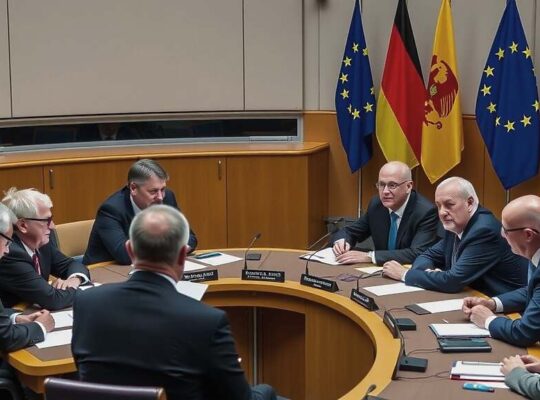The German government is reportedly considering a fresh exemption to the strict debt brake, potentially shielding interest payments on loans financing defense spending from its constraints. According to reports in the Handelsblatt, citing multiple government sources, Finance Minister Lars Klingbeil and Defense Minister Boris Pistorius (both SPD) have already discussed the proposal, sparking internal debate and raising concerns about fiscal responsibility.
If implemented, the adjustment could unlock a double-digit billion euro buffer within the federal budget in the coming years. Preliminary calculations by the IW, an institute closely associated with employers’ organizations, estimate that Klingbeil could potentially finance an additional €19.6 billion through debt between 2025 and 2029. This potential easing of budgetary pressures comes amidst a significant shortfall in the Finance Ministry’s planning for 2026-2029, currently projecting a €172 billion gap, with around €34 billion in 2026 alone.
The initiative, however, has triggered controversy within the governing coalition. Discussions regarding incorporating interest payments into the existing area exemption were reportedly floated during the constitutional amendment earlier this year, with opposition from the conservative Union bloc. Sources within the coalition confirm that their skepticism remains unchanged. The Chancellery has expressed a critical view of the Finance Ministry’s explorations, signaling deep reservations concerning the potential precedent and broader implications for fiscal discipline.
While Defense Minister Pistorius is said to support the proposal, potentially motivated by the increased financial demands of modernizing Germany’s armed forces, the move highlights a growing tension between the government’s commitment to increasing defense spending and its adherence to stringent budgetary rules. Critics argue that repeatedly circumventing the debt brake undermines the credibility of Germany’s fiscal policy and could ultimately lead to unsustainable levels of public debt, further complicating long-term economic planning and potentially eroding public trust in the government’s financial management. The emergence of this proposal underscores a fundamental political dilemma: balancing immediate security needs with the long-term sustainability of the nation’s finances.












